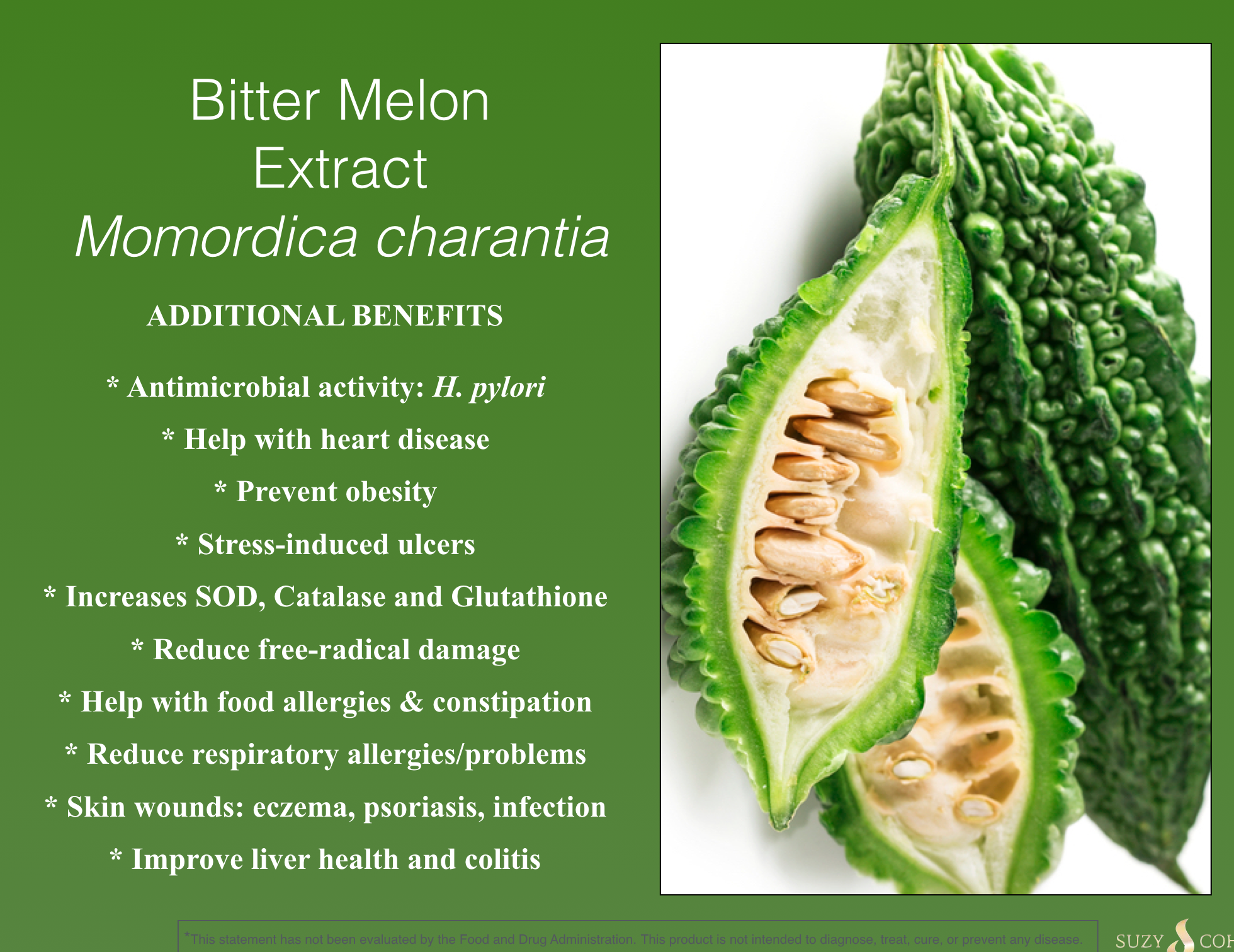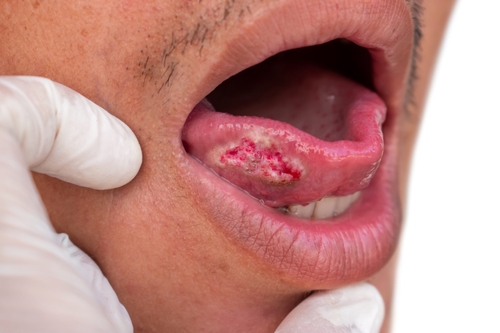What's On This Page?
ToggleBitter melon is an ingredient that I sourced and put into one of my dietary supplements for blood sugar and cholesterol regulation. It’s available at my shop and on Amazon – called GlucoScript MAX.
I wanted to write an article today about it because very few people realize how remarkable this herb is! It’s truly one of the most incredible natural products, and it deserves more attention. The focus of the benefits today have nothing to do with diabetes or blood sugar – it’s more about how it can support a person’s health if they are worried about oral cancer. Of course, speak to your oncologist. As for eating bitter melon – sure thing! There are recipes galore, after you read this blog, you’ll be convinced that some foods can be thy medicine, can’t they?
That’s a famous quote by Hippocrates and it underpins today’s article.
“Let food be thy medicine and medicine be thy food.”
One food, in particular has medicinal actions on the body. It’s Bitter melon. This is a gourd, in the pumpkin and zucchini family that is most famous for its role in supporting healthy metabolism and blood sugar (or other metabolic) biomarkers.* But at the first discussion of this with any traditional physician, they will tell you it’s just a folk remedy and not “approved” for anything that could help you. I disagree! 😤
As you know, I specialize in finding research on natural foods and medicine that work along the same pathways as drugs. I’m a pharmacist so I understand all of that. It’s useful for insulin and blood glucose markers.* 😊
Oral Cancer and Much More
But today’s article isn’t about insulin, diabetes or the obesity epidemic. It’s about mouth cancer. And if it can help your mouth, why not your stomach or colon? This is about bitter melon’s ability to perhaps improve the life of someone you know and/or augment chemotherapeutics. FYI, bitter melon has anti-bacterial activity against microorganisms such as H. pylori. It also happens to help raise liver production of some important antioxidants like glutathione, SOD, and Catalase. Catalase is able to neutralize peroxide.*
If you have the sensation of a burning mouth or similar type of pain then I want you to stop reading this blog, and CLICK HERE so that you can read my other blog specifically about that condition: 7 Considerations for Burning Mouth Syndrome.
About Bitter Melon
Bitter melon is a food, however the dried herb is commonly found in dietary supplements that target glucose, that part is well known! For the purposes of this article, I am referring to foods not a supplement. Writers cannot write and make beneficial claims about dietary supplements in the USA because only drug makers can talk about beneficial claims as they pertain to diseases. So again, I’m referring to bitter melon as part of your diet and how it can support a healthy mouth, tongue and throat.
Bitter melon contains botanical compounds that have been proven to improve insulin sensitivity and pancreatic release of insulin.* That’s why it’s used for that purpose, but it’s not known for oral cell proliferation and out of control cellular growth activity, which is today’s focus.

“Immunomodulatory Effects of Momordica charantia Extract in the Prevention of Oral Cancer.” That was the title of a scientific article. The researchers learned that bitter melon extracts can slow down the growth of oral dysplasia and squamous cells, at least in animal models. There has been a flurry of studies in the past few years to evaluate the effectiveness of bitter melon on various malignancies, but especially mouth types which smokers are susceptible to. Tobacco is not the only risk factor though.
There is a difference between what I’m talking about here, and lichen planus. Please read my other blog, Oral Lichen Planus vs. Oral Cancer: 5 Visual Differences You Need to Know.
Gene Expression and Cytokines in Oral Cancer
Certain pathways and proteins (inflammatory cytokines to be specific) increase like wildfire during the development and progression of oral problems. Your oncologist might be interested in which ones specifically so here they are: s100a9, IL23a, IL1β, and PD-1 protein (encoded by PDCD1 gene). These are what you might call immune checkpoints. When these are elevated, as they are in oral problems, proliferation is faster.
Bitter melon has been scientifically shown to significantly suppress all those proteins! It slows down the fire, slowing the progression of biochemicals that feed and fuel proliferation of bad cells. The study is important because it demonstrates the powerful and positive immunomodulatory effect of a relatively benign food!
Food that slow down cancer are of interest to most people because chemotherapy comes with side effects. Naturally, this is an animal STUDY so it’s not definitive for humans but I find it promising.
Signs and Symptoms
Early signs are easy to ignore because they are somewhat benign. If you have several of these and they persist for several weeks or months, you should see a qualified doctor to make sure you’re okay. Here are some signs and symptoms that occur in the mouth; by mouth I mean your cheek lining, gums, tongue, tonsil, inside of your lips or really anywhere in your mouth or throat:
Mouth sores
White or red patch
Numbness
Pain
Sore throat
Sensation of something caught in your throat
Difficulty swallowing
Swelling of the jaw
Change in voice
Lump in the neck
Pain in your teeth or jaw
Loose teeth
There are different types of oral cancer and the most common type is “squamous cell carcinoma.” Others include verrucous, salivary gland, and the lymphoma type.

Just FYI, there are many types of benign, relatively harmless mouth cysts and tumors. These typically get surgically removed or treated with medications. If not treated, some of the benign oral problems can turn into cancer and over time invade other parts of the body, this is termed metastasis. Early detection is critical and I don’t mean to worry you because most oral cancers are treatable if caught early.
Bitter melon (which is a food) was found to be useful in another brand-new STUDY published on October 21, 2019. The journal is called Cell Communication and Signaling.
This study was on human cells because the researchers already proved that bitter melon helped mouse. So, they wanted to evaluate its effect on real tissue from people with oral cancer. More specifically they wanted to see how key metabolic pathways responded to bitter melon. Did they shut down? Did they go into overtime? Did the human cells respond in a good way? Yes, they did! 😮
The researchers specifically wanted to know how bitter melon would perform on two different pathways involved in cancer and metastasis:
1. Glycolysis – This pathway is the process in which one glucose molecule breaks down to form two molecules of pyruvic acid (pyruvate) which is energy. It’s where you break down sugar from food into energy! It’s a pathway that occurs in animals, plants, and microorganisms.
2. Lipogenesis – This pathway is the process of taking glucose or acetyl-CoA and converting it to triglycerides. Simply put it’s where you take energy and turn it into fat.
I’ve really over-simplified those two pathways, but I’m just trying to make a point. In an otherwise healthy person, these pathways are necessary for good health in moderation and they work perfectly and provide benefits. But they become upregulated and start to work overtime, blowing the fire out of control during cancer.
So ideally, inhibiting both glycolysis and lipogenesis (putting the brakes on them for a while) would be one effective method to slow down cancer growth. And that’s exactly what bitter melon does, according to the STUDY.
Testing Bitter Melon
The doctors scraped off two different types of mouth cells from people who had existing oral cancer (Cal27 and JHU022) that were treated with the bitter melon extract. In other words, these were human cancer cell lines. Then they looked at the levels of RNA and various proteins which would put a flashlight on the amount of glycolysis and lipogenesis occurring.
Basically, they were checking out how the metabolism was performing in these cell lines and whether or not bitter melon could reprogram the cells and inhibit the two pathways listed above.
Here are some details for those of you who want to print this article and show it to your oncologist: The cancer cells that were treated with bitter melon showed statistically significant changes. There was a dramatic reduction in mRNA and protein expression levels of key glycolytic genes SLC2A1 (GLUT-1), PFKP, LDHA, PKM, and PDK3.
Pyruvate and lactate levels and glycolysis rates in oral cancer cells were reduced following bitter melon. In the lipogenesis pathway, we observed a significant reduction of genes involved in fatty acid biogenesis, ACLY, ACC1, and FASN, at the mRNA and protein levels following bitter melon treatment.
I know this is a lot of scientific jargon so here’s a good analogy for this very important, newly published study: It can rewrite the code in a software program to cause the cancer cells to stop growing so fast, and just die instead!
Long story short, the cells that had been treated with bitter melon extract were dramatically better off! This should be making headlines everywhere! Please share this article with anyone you know who has cancer because it is important news and it has just been released. Bitter melon was able to trigger apoptosis causing oral cancer cells to call it a day and ‘kill’ themselves! 😲
Bitter melon can reprogram metabolism.
We saw this in April 2018, in a mouse STUDY published in Cancer Prevention Research. The researchers fed rodents food with bitter melon in it and found that it could prevent oral squamous cell carcinoma. Cancer Prev Res (Phila). 2018 Apr;11(4):191-202. doi: 10.1158/1940-6207.CAPR-17-0237. Epub 2017 Oct 23.
This study found another mechanism of action by which bitter melon works. it can reduce MMP-9-related ossification (in this animal model, they’re referring to the bone formation of the mouse tongue) which may occur with oral cancer.
The researchers concluded that their data “strongly suggests” the potential clinical benefits of bitter melon as a “chemopreventive” agent in oral cancer. The mice that were fed bitter melon extract had reduced ossification! This is useful information in terms of prevention and adjunctive treatment of a very scary and uncomfortable type of cancer.
It’s about providing hope…
I realize that my articles are purely educational, but I hope they give you some hope and new options to consider. Bitter melon is a food, and you can find it in most health food stores, some regular grocery stores and online.
A paradigm shift needs to occur in one’s mind when being treated for cancer. It is a scary thing, but like many other malignancies, there are natural, proven treatments that can help and contribute to eradication, or inhibition of the rogue cells. Of course, be prudent, but also intelligent about choosing what is right for you and always always always speak to your doctor about cancer treatments. Print my article and take it in to your next appointment.
I’m aware that the implications of any natural anti-cancer herb and food are highly variable. There are many of you who will fare out well, some who will have no response, others might react, and still, others who might be allergic. Food and food/herbal extracts are just like drugs, they have many different mechanisms of action once inside your body, especially when you combine them with your own medications.
Please ask your physician about everything you’ve read today. This could be especially useful for you if your blood sugar levels are abnormal. Remember, bitter melon (Momordica charantia) is MOST famous for its dietary role in diabetes and metabolic syndrome, as well as obesity and carb control. If you’d like to print some information up, you could CLICK HERE to see what the biologically active components are in the bitter melon gourd.
How to Get More Bitter Melon and Bitter Melon Information
1. You can eat it, here’s my recipe Bitter Melon Stir-Fry
2. You can drink as Tea
3. There is more information in my paperback book, Diabetes Without Drugs
4. You can consider dietary supplementation – it’s available at health food stores nationwide. It is an ingredient in my own product GlucoScript MAX which is to support already healthy levels of blood sugar and cholesterol.

Suzy Cohen, has been a licensed pharmacist for over 30 years and believes the best approach to chronic illness is a combination of natural medicine and conventional. She founded her own dietary supplement company specializing in custom-formulas, some of which have patents. With a special focus on functional medicine, thyroid health and drug nutrient depletion, Suzy is the author of several related books including Thyroid Healthy, Drug Muggers, Diabetes Without Drugs, and a nationally syndicated column.



